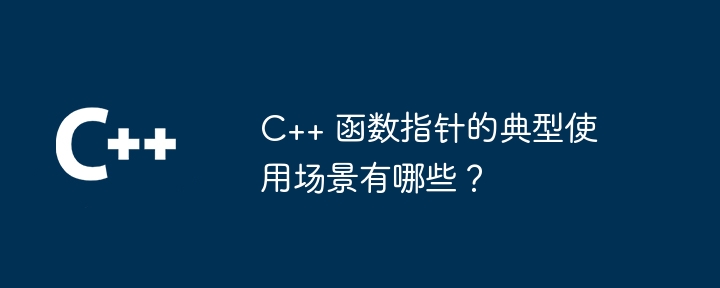Home >Backend Development >C++ >What are the typical usage scenarios of C++ function pointers?
What are the typical usage scenarios of C++ function pointers?
- WBOYWBOYWBOYWBOYWBOYWBOYWBOYWBOYWBOYWBOYWBOYWBOYWBOriginal
- 2024-04-17 21:57:011269browse
Typical scenarios for function pointers include: callback functions, sorting functions, event handling, function tables, lazy loading and underlying API interoperability. By using function pointers, functions can be called indirectly at runtime, enabling dynamic and scalable code. For example, callback functions are used to call back when asynchronous events (for example, user input or network requests) occur, sorting functions are provided for custom comparison algorithms for different object types, and event handlers are used to register and handle different types of events (for example, mouse clicks or keyboard input), the function table is used to store multiple function pointers for conditional selective calls, lazy loading can delay the loading of function definitions until they are called for the first time, and the underlying API interoperability allows the use of different functions Signed interactions with other languages or libraries.

Typical usage scenarios of C function pointers
Introduction
Function pointers are An advanced feature for programming and managing functions in C. They allow functions to be called indirectly at runtime, enabling highly dynamic and scalable code.
Typical scenarios
- Callback function: Callback when an asynchronous event (for example, user input or network request) occurs.
- Sorting function: Customize sorting algorithms for different types of object comparisons.
- Event handling: Register and handle various types of events, such as mouse clicks or keyboard input.
- Function table: Store multiple function pointers so that they can be selectively called based on specific conditions.
- Lazy loading: Lay loading function definitions until they are called for the first time.
- Underlying API interoperability: Allows interaction with other languages or libraries, even if they use different function signatures.
Practical case
Callback function
// 函数指针类型定义
typedef void (*CallbackFunction)(int);
// 定义回调函数
void PrintNumber(int number) {
std::cout << number << std::endl;
}
// 使用回调函数
void RegisterCallback(CallbackFunction callback) {
callback(10);
}
int main() {
RegisterCallback(PrintNumber);
return 0;
}Output:
10
Conclusion
Function pointers are a powerful tool in C that provide flexibility, scalability, and code reusability for a variety of programming scenarios. By understanding their typical usage scenarios, you can effectively leverage them to create robust and maintainable code.
The above is the detailed content of What are the typical usage scenarios of C++ function pointers?. For more information, please follow other related articles on the PHP Chinese website!

